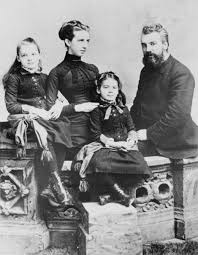
Does innovation come from within, or is it driven by outside forces?
We often think of innovation as a random stroke of genius, a spark of creativity ignited by a great mind.
But some of our most notable innovations have actually been the result of people who dedicated themselves to the service of others.
Compare and contrast two creative innovators, Alexander Graham Bell, who invented the telephone, and Pharrell Williams, the singer and producer who created the hugely popular song “Happy.”

On the surface the two men couldn’t be more different. Bell was a Scottish-born 19th century scientist and engineer. His family was long associated with the teaching of elocution. Both his father and grandfather were notable educators, and his father published many well-known works on the subject.
Williams is an American rapper and fashion designer, born in Virginia Beach in 1973 to a teacher and handyman. His music career started with band camp, he went on to form the Neptunes an R&B type group with a fellow camper, Chad Hugo. His recent work, “Happy,” hit number one in 24 countries, and sold over 5.6 million copies in the U.S. alone. The 24-hour long-form video plays in offices across America.
So what do William and Bell have in common?
Their best creative work was the result of Noble Purpose.
Alexander Graham Bell’s wife was deaf, as was his mother. He had conceived of the idea of “electronic speech” while visiting his mother in Canada. Bell’s Noble Purpose was to help the deaf. His endless experiments with hearing devices eventually culminated in Bell being awarded the first U.S. patent for the telephone in 1876.
The telephone wasn’t invented because Bell sat in a room trying to figure out how to make money. He was trying to solve a problem for people he loved.
I usually talk about Noble Purpose in the context of leadership and sales, but it’s the key drive behind great creativity and innovation.
Which leads us to Pharrell Williams.
One of Pharrell’s few disappointments was his first solo album in 2006. “It didn’t turn out the way I wanted it to. And I blamed everybody around me but myself,” he said during a

recent Today Show interview. “I really had to take a long study on what I was doing and talking about on that record.”
“That first record was too full of ego, he now says. “I realized along the way that there wasn’t enough purpose in my music,” Pharrell said. “Going back and listening to Stevie Wonder songs and Steely Dan songs, you’d see that Donald Fagen had a purpose. He had an intention. Stevie Wonder was really singing about something. He was tryin’ to say something.” Pharrell says now he wants his music to lift people up.
Shifting from ego to Noble Purpose has resulted in Pharrell’s most popular work to date. You can’t listen to the radio for more than 20 minutes without hearing “Happy,” and the 24-hour long-form video is a creative breakthrough.
If you want to create a great company, invent the next big thing, or produce an amazing work of art, keep your ego out of it. Start with noble purpose, find a problem you want to solve, or people you want to help, and pour your talents into something bigger than yourself.
Innovation for others isn’t just noble, it’s more successful.